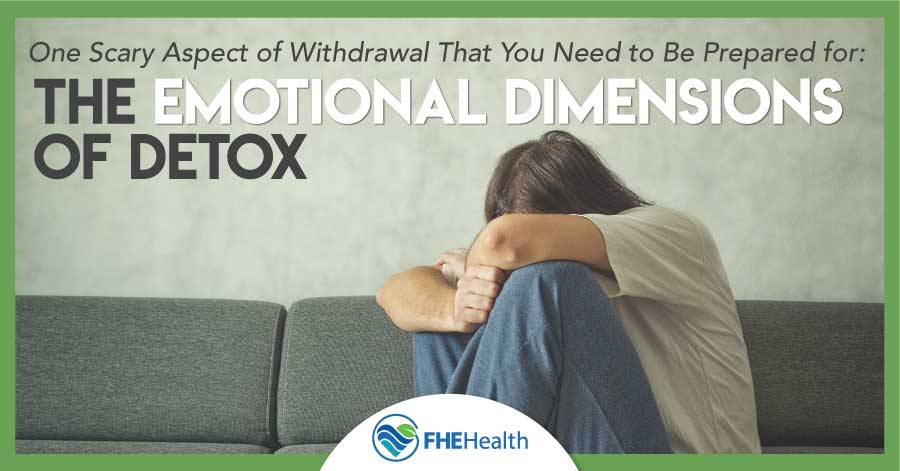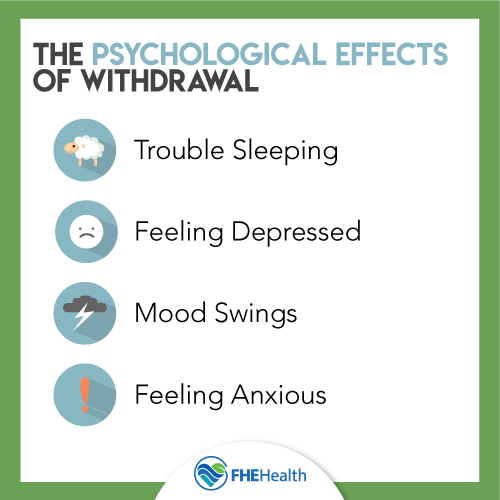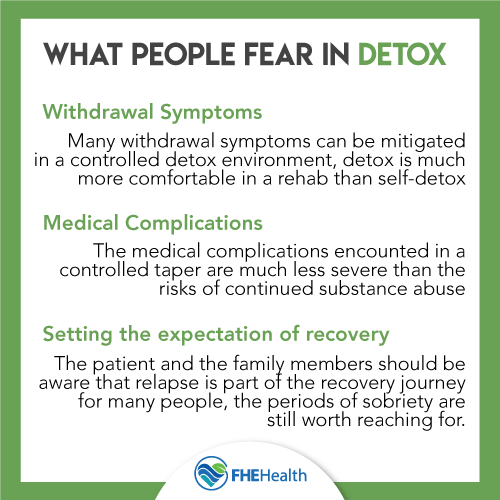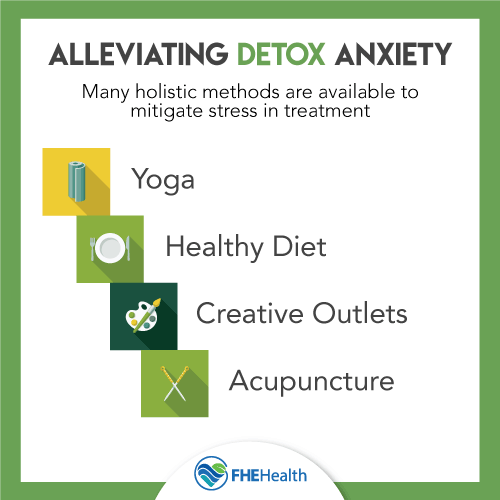
When you’re in detox, you might expect some physical symptoms of withdrawal, but the emotional symptoms might catch you unaware. The psychological effects of withdrawal can make detox more difficult and can even make you avoid or procrastinate entering a treatment program.
According to the National Institutes of Health, only 18.5 percent of the approximately 22.5 million people in America who need treatment for drugs or alcohol seek out help, so finding ways past your fear is essential if you want to escape the dangers of substance abuse and addiction. Knowing what to expect and having a plan in place to deal with these emotional reactions helps you work through the psychological symptoms and improves your chances of success during recovery.
The Psychological Effects of Withdrawal
 During the detoxification process, you might experience a wide range of emotional symptoms. Some common psychological effects during this phase of treatment include:
During the detoxification process, you might experience a wide range of emotional symptoms. Some common psychological effects during this phase of treatment include:
- Being scared of the detox process
- Being nervous about possible medical complications
- Experiencing panic attacks
- Feeling depressed
- Feeling anxious
- Having trouble sleeping
- Overreacting emotionally to small events
- Feeling numb to emotional events
- Loneliness
- Mood swings
- Cravings
- Experiencing an impending sense of doom
Fear and the Withdrawal Process
 The physical symptoms of withdrawal while you go through detox can be daunting, and it isn’t unusual to be afraid of what you might experience as your body rids itself of drugs and alcohol. If you’ve been through withdrawal before, the memory of pain or discomfort might increase that fear.
The physical symptoms of withdrawal while you go through detox can be daunting, and it isn’t unusual to be afraid of what you might experience as your body rids itself of drugs and alcohol. If you’ve been through withdrawal before, the memory of pain or discomfort might increase that fear.
Other common fears during detox include fear of medical complications and of the difficult work to come during the long recovery process. Some people also become afraid of relapsing after all of that hard work to become sober. In some cases, the fear can be so debilitating that people avoid seeking help. People sometimes think they have to put off entering an addiction treatment program until the fear goes away. It’s fine to enter withdrawal scared, though.
At FHE, we have professionals on staff to help you deal with both the physical and psychological effects of withdrawal. Having someone there to assist you in working through your fears and anxiety can make the process easier and increase your chance of success.
Some people in recovery can work through their fears completely and learn to approach the treatment process with a positive attitude, while others learn coping techniques that don’t necessarily eliminate the fear but bring it to a manageable level, instead.
Anxiety During Detox
Sometimes fear can turn into full-blown anxiety during the recovery process. You might have panic attacks or worry incessantly about whether you’ll be able to break free from drugs and alcohol.
Many people in detox develop a feeling of impending doom that becomes almost overpowering. This fear of impending doom often precedes a panic attack. This is an actual medical symptom that involves feeling as though your death is going to occur soon and there’s nothing you can do to stop it.
Anxiety can also lead to insomnia or other sleep difficulties, which leaves you tired and more likely to spiral into anxious thinking. If you’re experiencing anxiety during withdrawal, a skilled counselor can help you break out of a pattern of anxious thoughts.
When Psychological and Physical Symptoms Blend Together
In some cases, it’s difficult to determine where physical symptoms end and psychological symptoms begin because the body often reacts physically to emotional distress. Symptoms such as nausea and shaking could be a reaction to the physical removal of the drug from your system, or they could be a reaction to the fear and anxiety you feel during the detox process.
Lower dopamine levels in the brain during detox could also cause psychological withdrawal symptoms such as anxiety and depression. Because FHE Health treats both addictions and mental health disorders, our staff is uniquely equipped to deal with psychological withdrawal effects and concurrently treat any underlying mental health issues that complicate addiction and recovery.
How Long Psychological Withdrawal Symptoms Last
How long your psychological withdrawal lasts depends on your personal biology and the specific addiction. Some drugs, including cocaine, marijuana and ecstasy, produce little to no physical withdrawal symptoms but plenty of emotional and psychological symptoms during withdrawal.
Other substances, including alcohol and opioids, produce both physical and psychological symptoms. For some people, the psychological withdrawal symptoms last 5 to 7 days. In other cases, the psychological effects stick around for weeks, months or even years. If there are concurrent mental health issues in addition to addiction, these could affect how long you experience psychological withdrawal from drugs and alcohol.
How Medically Supervised Detox Can Help
Medically supervised detox at FHE can help you cope with both physical and psychological withdrawal symptoms. During a medically supervised detox program, you stay onsite and get 24/7 monitoring by medical professionals so you can get treatment for any withdrawal symptoms as soon as they arise. In some cases, this includes medication to treat severe symptoms, but in other cases, assistance comes in the form of therapy to help you develop coping methods for emotional symptoms.
Another way medically supervised detox can help is in preventing relapses during withdrawal. Trying to detox at home can be challenging, and the psychological effects can lead you to return to using drugs or alcohol. Medical supervision short-circuits the impulse to relapse and keeps you on track through the toughest parts of withdrawal.
Therapeutic Approaches to Psychological Withdrawal
 Because psychological symptoms can last long beyond the point at which your body has successfully rid itself of drugs and alcohol, long-term treatment for fear, anxiety and other emotional symptoms is often part of an overall recovery program.
Because psychological symptoms can last long beyond the point at which your body has successfully rid itself of drugs and alcohol, long-term treatment for fear, anxiety and other emotional symptoms is often part of an overall recovery program.
Cognitive behavioral therapy, 12-step meetings and motivational interviews can all be part of a comprehensive approach to the mental and emotional aspects of recovery. We also offer cutting-edge treatment for addiction and withdrawal symptoms, including Neurofeedback training, to help give you the absolute best chance of long-term success.
If you’re concerned about the psychological effects of withdrawal, our trained staff can help ease your anxiety and develop a plan to tackle any symptoms that might arise. Call us today at (844) 299- to find out how to start your journey toward recovery and break free of the fears and emotional symptoms holding you back from a happy, sober lifestyle.






